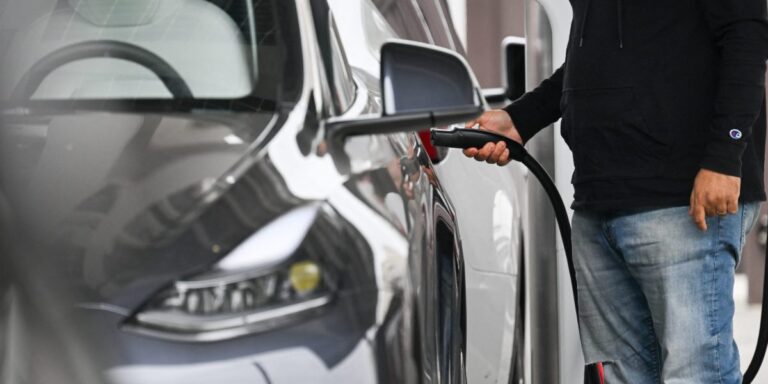Tehmina Haider and Michael O’Leary lead L Catterton Impact, the impact investing arm of consumer private equity firm L Catterton. Michael: The rise of responsible civic capitalism (HarperCollins 2020).
This spring, ExxonMobil CEO Darren Woods said: Fortune Magazine It’s consumers, not ExxonMobil, that are blocking the transition to clean energy: “There’s an opportunity to make fuels with less carbon, but people aren’t willing to spend the money to do it,” he said.
The SEC’s new rules on climate disclosure similarly place the burden of emissions on consumers’ shoulders: Publicly traded companies must report their emissions, but they don’t have to include the emissions that come from consumers who use their products. Instead, those emissions remain an implicit part of emissions. Consumer Carbon footprint.
Many in the climate community resent blaming consumers – after all, even the concept of a consumer “carbon footprint” was only popularized by a BP-funded advertising campaign in the early 2000s.
But Darren Woods is right in principle: it doesn’t matter how sustainable a product a company makes if consumers don’t buy it. Instead of blaming consumers for the actions of companies, we should focus on what consumers actually want to buy.
In the climate movement, we have too often taken a “build it and they will come” approach to climate investment, assuming that if we could develop the technology, climate-conscious consumers would be happy to adopt it. Consider transportation and food: these account for around half of total consumer emissions in many countries. In each sector, we have developed technologies that would bring significant reductions, but we are only now seeing how fragile consumer adoption has been.
The “cradle-to-grave” emissions of today’s electric vehicles are 48 percent lower than comparable gasoline-powered cars, according to the Department of Energy’s latest analysis. But electric vehicles accounted for just 7.6 percent of auto sales in the U.S. last year, up from 5.9 percent the year before, but still far from the plan for two-thirds of cars sold to be electric in some form by 2030.
Independent assessments of alternative proteins in our food system suggest emissions reductions of up to 90% compared to beef – a similar magnitude to the reductions achieved by adopting a vegan diet – but with a market share of just 2%, alternative proteins are not yet mainstream.
Overall, consumption accounts for 72% of greenhouse gas emissions, just over 68% of consumers’ share of U.S. gross domestic product. To limit global warming to 1.5°C above pre-industrial levels, we need to reduce per capita emissions by 50% within a decade. But the emissions reductions that these and other climate technologies boast will only come to fruition if consumers become attached to them enough to loosen their purse strings.
At the impact fund we lead, we find that despite a lot of research showing how interested consumers, especially younger consumers, are in shopping sustainably, the reality is more complicated.
Consumers may love sustainability, but they hate the trade-offs
Across any given category, consumers tend to have a set of criteria that they value most, including price, quality and convenience. Currently, 80% of consumers say it’s important that a brand is sustainable, yet sustainability is rarely among their most important criteria. When forced to make a trade-off between sustainability and other factors, support for sustainable options can drop by more than 70%.
In fact, one of the reasons plant-based meat growth has stalled is that while they’ve come close to mimicking meat, they haven’t yet beaten the taste and nutritional criteria that matter most to consumers: Many consumers are wowed by these nearly-matched meat alternatives, but not enough prefer them.
The only way to increase long-term adoption of sustainable products is to find ways to reverse the trade-off and make sustainability a positive driver of product adoption. other Criteria that consumers value. Ironically, a product will only achieve mainstream success if consumers prefer it for reasons unrelated to sustainability.
For example, consumers are far more likely to buy dairy alternatives because they are healthier and taste better than for environmental reasons, which organic produce has long enjoyed. Electric heat pumps, which now account for the majority of new heating system sales in the U.S., save the average consumer money. More Gen Z consumers say they buy sustainable brands because of quality and value, not climate concerns.
As with any consumer market, consumer segments may value factors differently. For decades, cars sold in Europe have been about 50% more fuel-efficient on average than cars sold in the United States. This is not due to uniquely European technology; it is due to historical consumer preferences, supported by stricter regulations. A similar pattern is replicated with electric vehicles, whose penetration rate in Europe is twice that of the United States.
While much of the discussion about climate enterprise focuses on cutting-edge technology, innovation in business models can also have a big impact.
Resale, rental, refillable products and reusable packaging all require little new technology and can deliver results that exceed key consumer purchasing criteria. For example, second-hand clothing is growing much faster than clothing overall as it satisfies consumers’ desire to save money.
The lesson is simple: the consumer is still king. If we want to make significant progress toward a net-zero emissions world, we need to create products that consumers want to buy over conventional alternatives. And that’s far more important than deciding whose environmental balance sheet emissions are measured on.
We can’t blame consumers for climate change unless we give them better choices.
See more must-read articles luck:
The opinions expressed in Fortune.com editorial articles are solely those of the authors and do not necessarily reflect the opinions or beliefs of the authors. luck.

